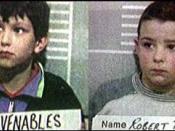It's almost ten years ago when Great Britain was shocked by the news that reported the most horrifying, inhuman and savage crime. In February 1993, the British judges, lawmakers, and attorneys were facing a brand-new murder. " A toddler, aged 2 years, was abducted and exposed to torture and finally battered on the railroad tracks waiting for a train to dismember him," is the new crime judges in that time were dealing with (Ripley). What is more odd in this story is that the murderers were juvenile. Both of them were only 10 years old when they committed that abduction. British judges sentenced the duo 16 years in prison. Yet, their "good behavior" was the reason on which the board of judges in Britain built their decision of releasing the pair after serving only nine years in prison, and that what infuriated the little boy's parents. With their early release, the light has been shed again on this unbearable crime.
Many British citizens, writers and T.V presenters started to debate this crime again. Few supported the early release, but the majority of the British were completely against what they called unreasonable release. In the following lines, two opposite opinions are introduced, but only one has the power to convince its audience more than the other.
Stephen Scott, a famous writer in the Guardian newspaper, in his article "Give them a chance," focuses his attention on the background of the pair. "Both were from difficult families," Scott says. They lived miserable lives among their siblings. They were raised in one-parent families. Their fathers abandoned them and remarried other ladies. In addition, one of the offender's brothers attempted suicide due to the hard life they lived (Scott). The other offender used to make trouble among his colleagues in school. He once...


